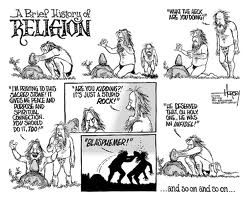How and Why Do Religions Get Started?

Here's One Version of God
If God Exists, Why Doesn't He Clearly Reveal Himself?
Whatever our beliefs, we humans are mostly skeptics when it comes to religion. Even the most ardent fundamentalists, by definition, reject the overwhelming majority of religions. So we are all forced to explain how religious beliefs that are not literally true came into being in the first place.
When confronted with an enormous variety of contradictory religious belief systems, the most logical response seems to be atheism. If the supernatural does not exist, then it makes sense that religions, which are purely manmade, would vary tremendously. Some, like myself, are uncomfortable with such an extreme position. Since the supernatural is, by definition, unobservable, how can anyone be certain of its nonexistence? This is why some religious skeptics call themselves agnostics. To an atheist, however, agnostics are unwilling to recognize the implications of their uncertainty. If some sort of a God or spiritual force exists, then why doesn’t this entity clearly identify itself? Why leave us humans on our own to flail away searching for the truth? Maybe the supernatural is not benevolent, and this God, sprit or whatever enjoys revealing himself (itself) in various ways just to mess with our heads. So if this entity either wants to keep its distance or screw with our minds, then it is logical to not be concerned with theoretical, irrelevant, and unhelpful supernatural forces. If agnostics had any guts, they would face the fact that the supernatural is probably nonexistent anyway. To an atheist, an agnostic is an “atheist without balls.”
But if beliefs in the supernatural are completely false, then how did these beliefs get started? In theory, this question is easy to answer. Religion can meet some basic needs of creatures like us that have the capacity to ponder the meaning of their existence. It can help us deal with death, provide a basis for our moral or legal principles, tell us where the heck we came from, and help us feel that someone or something is out there to help us. These general functions, however, are not particularly helpful in explaining how specific religions began.
For example, some religions trace themselves back to a specific individual who claimed to be some sort of a prophet or messianic figure. So what was going on in this person’s head? Were people like Jesus, Mohammed, the Buddha, and Joseph Smith deluded souls who really believed what they were saying, or were they just talented con men? While I find the psychological makeup of religious leaders interesting, the real mystery is why anyone listened to them. If someone told me that he had a vision from God yesterday, I would refer him to a local psychiatrist. He would then most likely join the ranks of thousands of would-be prophets unable to attract a sustained following. But every now and then, individuals come along who are able to attract a mass following. So when these followers wrote down the exploits of their religions’ founder, were they lying, delusional, or somehow tricked into believing that these stories were true? What qualities did these religious leaders have that caused others to believe such outrageous claims? Of course, there is always the possibility that one of these guys was for real. But even if you accept that premise, you still have to explain the success of the phony ones. One thing seems for certain. Human beings have the capacity to believe just about anything, no matter how irrational. This is borne out in the world today as strange religions and cults are constantly coming into being. In ancient, pre-scientific times when it was difficult to acquire any verifiable information, people may have been even more gullible (or desperate for a savior.)
Even bigger mysteries are the religions that do not trace themselves back to any specific founder. Instead of being “revealed” through some sort of a prophet, they seem to have evolved gradually over time. So at what point did a culture’s cosmology go from being theory to articles of faith? Did some prominent figures in the society wake up one day and somehow convince everyone else that they had finally figured it all out? Maybe stories passed down originally as allegories became more entrenched over time, and people gradually confused the symbols and imagery with reality. In other words, people evolved into fundamentalists, and stories changed from allegorical myth into literal truth. For the religious leaders who claimed special insight into these truths, there were definitely some strong, personal incentives for convincing others that this “divine wisdom” was real.
No matter what belief system you choose, the majority of people on earth think that you are wrong. The challenge is coming up with some consistent criteria by which you can judge all of the various options, something that is particularly difficult to do when judging the belief system in which you were raised. Since it is impossible to know anything for sure, many choose to toss reason aside somewhat and faithfully cling to what is the most familiar. I am not one of those people. But what do I do when neither atheism nor faith in one particular belief system is satisfying? And does agnosticism, which might seem like a middle ground, just leave me with a theoretical, irrelevant divine force that is of little help to the human race?
Then again, there may be good reasons why a divine, benevolent force – we will call it God from now on to save time - would choose not to reveal himself in ways that we would expect or prefer. Divine revelations through people and/or scriptures are inherently flawed strategies. Since people are notoriously unreliable witnesses, it is impossible to know if they are credible. And scriptures, by definition, suffer from all of the weaknesses of writing as a form of communication. Words are inexact, difficult to translate properly into different languages, and can be interpreted in a variety of ways. Of course, God could perform some overwhelming miracles from time to time in order to compel us to believe. Doing that, however, would wipe away human free will, and a noble being would take little satisfaction from intimidating people into submission.
So if God cares about humanity and wants humans to reach their potential, what communication strategy could he use that keeps human free will intact? As a self-proclaimed educator, I think that it may be best to use a teacher analogy. Teaching, at its best, is not simply about cramming information into people’s heads. Instead, it is about helping students to develop thinking skills that will stay with them for the rest of their lives. Maybe all that God needs to do is give us the skills that we need – a capacity for reason, empathy, compassion, community, etc. – to seek truth and become more ethical, compassionate human beings. It is then up to us to use them. The most basic and profound truths in life are pretty simple. It does not take a philosophic or theological genius to figure out that it is better to be nice and reasonable than to be mean and irrational.
The human race has spent thousands of years pondering the great questions of life and coming up with fancy philosophic and theological systems. But too often, we have lost sight of the simple truths that are staring us in the face. We ask God for a clear revelation. We want prophets, scriptures, miracles, and/or powerful mystical experiences. But if we would just remember to open our eyes, we would see that we already have everything that we need.









